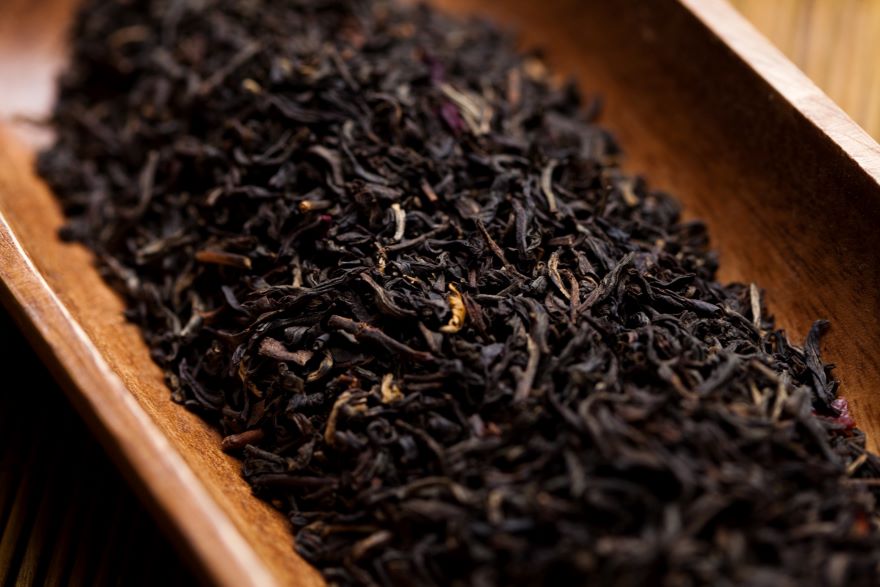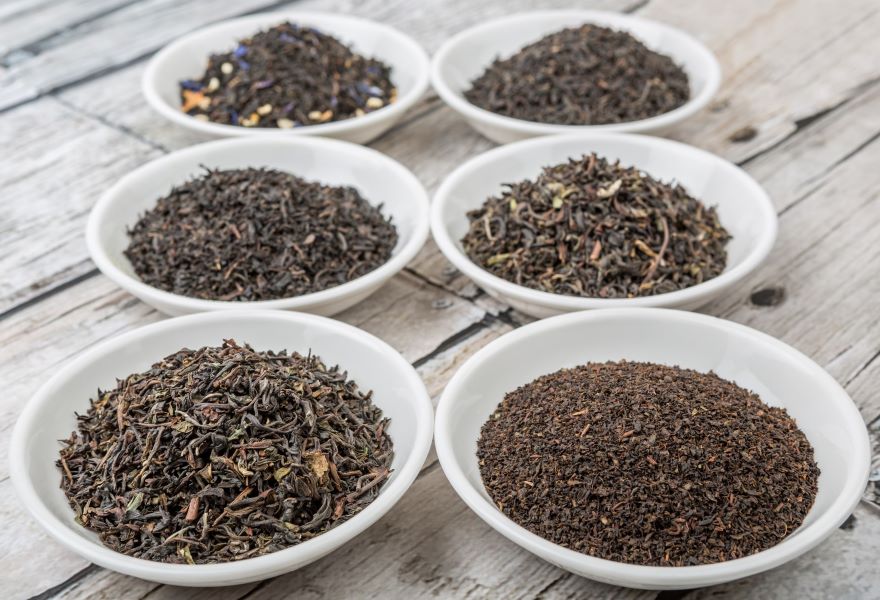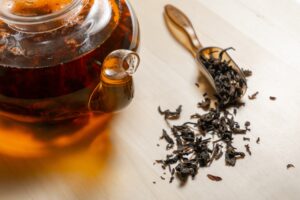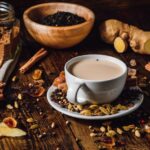Loose Leaf Black Tea
Black loose leaf tea offers rich flavor and health benefits, making it a popular choice for tea enthusiasts. As a major category of tea, black tea consists of leaves from the Camellia sinensis plant that have undergone a process of withering, rolling, fermentation, and drying, resulting in a distinct color and bold taste profile. Loose leaf black tea offers robust, nuanced flavor with whole or slightly broken leaves, unlike typical tea bags.

A wide range of loose leaf black teas includes traditional blends like English Breakfast and Russian Caravan, and unique Earl Grey twists. When choosing loose leaf black tea, consider quality, flavor profiles, and preparation methods, with esteemed origins like Assam, Ceylon, and Lapsang Souchong.
Key Takeaways
Loose leaf black tea offers a richer flavor than bagged tea due to its less processed nature. There are various types of black teas available, including traditional blends and single-origin options. Consider quality, flavor profiles, and preparation methods when choosing the best loose leaf black tea.
What is Loose Leaf Black Tea?
As a tea lover, I’ve found loose leaf black tea to be a fantastic choice for robust flavors and delightful experiences. Loose leaf tea comprises whole, unpackaged leaves, distinct from the commonly seen tea bag varieties. With black tea, loose leaves provide a distinct advantage, offering higher-quality ingredients for superior taste and aroma.
My journey with loose leaf black tea has taught me the importance of selecting high-quality leaves. A great cup of black tea starts with choosing leaves from reputable estates or regions known for their expertise. With its bold and robust flavor, black tea is an excellent choice for those who want to embark on an adventure in the world of loose leaf tea.
In brewing loose leaf black tea, I’ve learned that a little finesse goes a long way. The process may require additional attention compared to using tea bags, but the rewards are well worth the effort. Plus, loose leaf teas offer numerous health benefits like antioxidants, vitamins, nutrients, and anti-bacterial properties, making it a tasty and healthy choice for tea enthusiasts like me.

Types of Black Tea
Assam Black Tea
When I think of robust and malty flavors, the first thing that comes to my mind is Assam black tea. This tea variety is grown in India’s northeastern state of Assam, and is available in two main types: orthodox and CTC tea. I prefer the orthodox version, as it is made using traditional methods and is considered of higher quality than tea made for tea bags. So, you might ask, what makes this tea special? Its strong, full-bodied flavor makes it ideal for a morning pick-me-up or any time you need a boost throughout the day.
Darjeeling Black Tea
Have you ever wondered what “the Champagne of teas” tastes like? That’s what many people call Darjeeling black tea, and for a good reason. This tea comes from the Darjeeling region in India and is known for its delicate, fruity, and floral flavors. What sets Darjeeling black tea apart is its unique muscatel taste, which refers to the grape-like aroma and flavor. I highly recommend trying this tea if you’re a fan of nuanced and complex flavors in your cup.
Ceylon Black Tea
If you’re looking for a versatile black tea option, Ceylon black tea won’t disappoint. Ceylon black tea is grown in Sri Lanka and offers a range of flavors, from fruity and floral to bold and rich. When I want a tea that pairs well with different foods or I need to make iced tea, I often go for Ceylon black tea. Does it sound like your cup of tea? Give it a try, and you might find your new favorite brew.
Each of these loose-leaf black teas offers a distinct flavor profile, giving you plenty of options to explore and enjoy. So, next time you’re in the mood for a cup of black tea, consider trying one of these delightful varieties. You just might discover a new favorite!
Benefits of Loose Leaf Black Tea
As a tea enthusiast, I absolutely love trying different types of teas, and loose leaf black tea has a special place in my heart. Let me share some of the reasons why incorporating this tea into your daily routine can be beneficial.
First and foremost, black tea is abundant in antioxidants, which play an important role in maintaining our overall health. Antioxidants help protect our cells from damage caused by free radicals, helping us minimize the risks of chronic diseases.
Another upside I have noticed from drinking black tea is that it has proven to be effective in boosting focus and mental alertness. This is due to the caffeine content and the presence of L-theanine, an amino acid known for its cognitive-enhancing properties. The combination of these two elements provides a stable and steady energy, keeping you alert and focused without causing jitters like coffee might do.
As a tea lover, let me assure you that the taste also makes it worthwhile. There are many high-quality loose leaf black teas available, each offering a unique flavor profile. I particularly enjoy exploring the teas from renowned regions like Darjeeling, Assam, Ceylon, and Keemun Tea Researcher.
In conclusion, as a fellow tea enthusiast, I invite you to give loose leaf black tea a try and experience its multitude of benefits for yourself. Not only does it boost your health, but it also offers an enjoyable and delightful taste experience.
How to Prepare Loose Leaf Black Tea
When it comes to making a delicious cup of tea, I find that it’s all about technique. There are a few key steps in order to ensure the perfect infusion for this full-bodied beverage. Here, let me walk you through my process.
First and foremost, I select a high-quality loose leaf black tea. The quality of the tea matters because it impacts the flavor profile of the final cup. I also note the recommended water temperature and steeping time, as each type of tea requires slightly different parameters for optimal brewing.
Before steeping the tea, I preheat my teapot or teacup to help maintain a consistent temperature during the brewing process. I do this by pouring some hot water into the vessel, waiting a moment, and then discarding the water.
With the tea infuser or strainer at the ready, I measure out the appropriate amount of tea. This is around one teaspoon of tea per 8-ounce cup of water. I place the tea leaves into the infuser or strainer, and then place inside the preheated teapot or teacup.
Now comes the crucial element – water temperature. Black teas generally require water that is near boiling, typically between 200°F and 212°F (95°C to 100°C). I heat the water to the appropriate temperature and pour it over the tea leaves in the strainer.
Following the steeping time for the black tea I am brewing (usually 3-5 minutes), I remove the infuser or strainer from the teapot or teacup, making sure to shake off any excess water from the leaves.
And there you have it – I consistently produce a perfectly brewed cup of loose leaf black tea that I can savor and enjoy. Feel free to experiment with different black tea varieties and adjust the steeping time and water temperature to suit your preferences.
Buying Guide for Loose Leaf Black Tea
When it comes to purchasing loose leaf black tea, I always consider several factors to ensure I’m getting the best quality and flavor. Here’s my advice for you when shopping for loose leaf black tea.
First, decide what variety of black tea you’re interested in. There are many different types, ranging from traditional Darjeeling or Assam to more unique blends like Earl Grey or Lapsang Souchong. Knowing which type of black tea is your preference will help narrow down your choices.
Next, consider the quality of the tea. Look for tea companies that are transparent about where their tea is sourced, ensuring that it is ethically sourced and harvested. Opt for companies that provide organic, fair trade, or kosher certified teas when possible, as these certifications ensure quality and sustainability.
When selecting a tea, pay attention to the appearance of the loose leaves. High-quality black teas should have whole and unbroken leaves, as well as consistent color and size among the leaves. This ensures a better brewing experience and a more nuanced flavor profile.
Another aspect to consider is the packaging, which should be airtight and opaque to protect the tea from exposure to light, air, and humidity. This ensures that the tea remains fresh for as long as possible. Some brands offer resealable pouches or tins specifically designed for tea storage.
Finally, don’t be afraid to try new varieties and blends, as your taste preferences may change over time. Many online tea shops offer sampler sets that allow you to taste several teas before committing to a larger purchase, which is an excellent way to explore different flavors and find your ideal black tea.
Following these tips will help you make well-informed decisions and ultimately enjoy your loose leaf black tea experience to the fullest.
Preservation and Storage of Loose Leaf Black Tea
As a tea enthusiast, I’ve found that proper storage is essential to preserve the flavor and aroma of my loose leaf black tea. It is crucial to keep tea leaves away from oxygen, as they continue to oxidize over time with exposure to air. Even when stored in an airtight container, a small amount of air remains in between the leaves and at the top of the container. Using an airtight, opaque container will protect the tea from light exposure, which can degrade its quality. Stainless steel containers are my go-to choice, as they block sunlight effectively and are typically designed for sealable storage.
Another aspect that I pay close attention to is where I store my loose leaf tea. Ensuring that the tea is far away from any strong odors helps prevent the leaves from absorbing the scent of surrounding items. Moreover, I store my tea in a dark cabinet or an opaque container to limit sunlight exposure, and I keep delicate teas separate from those with strong fragrances. Humidity is another factor to consider, as it can negatively impact the quality of the tea. I avoid storing my tea in humid areas of my house or kitchen.
Lastly, taking care of the containers themselves is also important. After I’ve used up all the tea, I wash and dry the container and let it air out to remove any lingering aroma. This can range from a few hours to a few days, depending on the strength of the scent, and may require additional washing. Once the smell is gone, the container is ready to store more tea. Following these guidelines, I’ve been able to preserve the freshness and flavor of my loose leaf black tea for longer periods, allowing me to enjoy a delicious cup any time.
Conclusion
I have explored the world of loose leaf black tea and discovered its rich history, cultural significance, and unique flavors. Brewing it requires some finesse, but the rewards are truly worth the effort. Choosing high-quality loose leaf black tea sourced from reputable estates or regions enhances the overall tea experience.
As I delved deeper, I came to appreciate the health benefits associated with black tea, including its antioxidant properties. Consuming antioxidants not only helps improve overall health but may also decrease the risk of chronic diseases.
I learned the importance of ethical practices in the tea industry, as promoting sustainability and responsible consumption can contribute to a better future. Loose leaf black tea exhibits a diverse world of flavors and characteristics, each telling a unique story. Comparing loose leaf black tea and tea bags, I have come to believe that loose leaf tea is the superior choice for flavor, quality, and sustainability.
My exploration into this timeless beverage has expanded both my appreciation and palate and I hope it has done the same for you. As a tea enthusiast, I am excited to continue uncovering more delightful experiences and blends within the vast realm of loose leaf black tea.
Frequently Asked Questions
What are the health benefits of loose leaf black tea? Black tea offers several health benefits. It is known to be great for digestion, heart health, energy, and immunity due to its antioxidant properties, vitamins, and nutrients source:. Drinking black tea can also help soothe intestinal activity and aid digestion for those with chronic stomach-related disorders.
Which brands offer high-quality, organic loose leaf black tea? There are numerous brands offering high-quality, organic loose leaf black tea. I recommend looking for certified organic tea brands that have clear sourcing policies and rigorous quality control.
How to properly brew loose leaf black tea?
To brew loose leaf black tea, follow these steps:
- Boil fresh filtered water. The suggested brewing temperature for black tea is around 195°F to 205°F, just below boiling point.
- Measure 1 teaspoon of loose leaf black tea per 8 ounces of water.
- Add the loose leaf tea to a teapot or infuser.
- Pour the hot water over the tea and let it steep for 3 to 5 minutes, depending on your taste preference. Black tea can become bitter if over-steeped.
- Strain the tea leaves and pour the tea into a cup. Add sweeteners or milk to taste, if desired.
What is the difference between black tea and other types of tea?
All tea types come from the same plant, Camellia sinensis, but are processed differently. Black tea is fully oxidized, giving it a darker color and stronger flavor compared to green, oolong, and white teas. Green tea is unoxidized, retaining more of its natural green color, and has a lighter taste. Oolong tea falls between black and green teas, with a partial oxidation and distinct flavor profile. White tea is minimally processed and has a delicate, subtle flavor.
Can loose leaf black tea be used for iced tea? Yes, loose leaf black tea can be used to make iced tea. Brew the tea using the steps mentioned earlier, then let it cool to room temperature. Once cooled, pour the tea over ice and enjoy. You can also add fruit to enhance your iced tea experience.
Where can I buy premium loose leaf black tea? You can purchase premium loose leaf black tea online or at specialty tea shops. Some recommended online retailers include Art of Tea, Rishi Tea, and Adagio Teas. Be sure to read reviews and explore their offerings to find the best tea for your preferences.


 Previous Post
Previous Post Next Post
Next Post